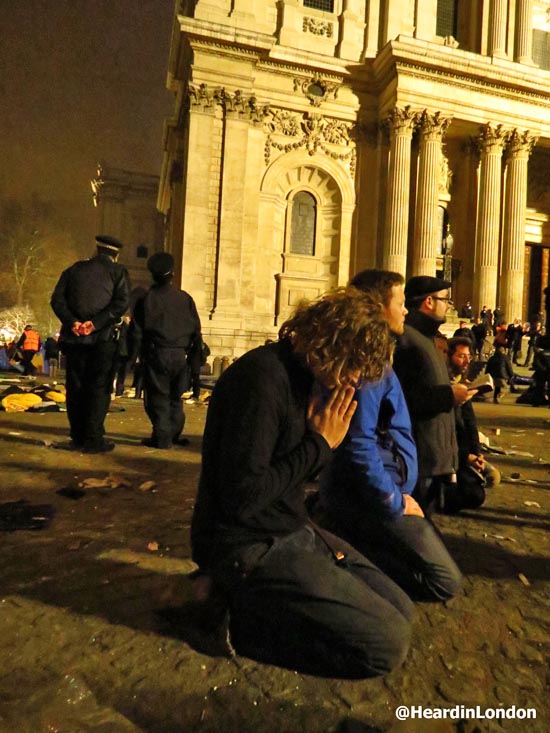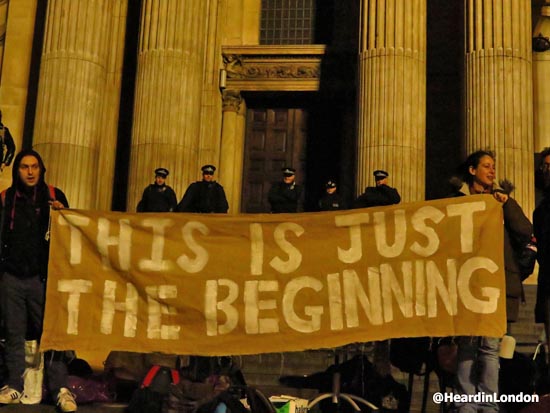
NEW SG Interview: John Cooper QC – Legal Advisor To Occupy London0
Posted In Activism,Blog,Interviews,Politics

Image courtesy of: @HeardinLondon
“The integrity, the maturity, and the far sightedness, and the fact that the occupiers are holding genuine, proper beliefs, has been vindicated in the court and that is an important step forward.”
– John Cooper QC

“Presently analysing events of tonight at #OccupyLSX. Who needs sleep!” It’s 3:26 AM GMT on Tuesday, February 28, 2012, and John Cooper, Occupy London’s chief legal advisor is awake, on Twitter, and on the case following the movement’s eviction from their marquee St Paul’s Cathedral base.
The eminent barrister and Queen’s Counsel has worked tirelessly to keep the protesters in situ since the occupation began on Saturday, October 15, 2011. The battle the occupiers faced was made all the more complicated by the provenance of the site they were camping on, which straddles land owned both by the Church of England and by the City of London Corporation (a unique and ancient semi-private municipal authority which governs London’s square mile financial district).
When the first tent was pitched, even the most optimistic of Occupiers couldn’t have predicted the encampment would remain in tact over four months later, so Occupy London’s ultimate eviction from St. Paul’s can hardly be considered a defeat. An early attempt to remove protesters was thwarted when the Cathedral’s then Canon Chancellor, Giles Fraser, recognized the occupiers’ right to protest peacefully and asked the police to leave. Fraser’s actions would ultimately lead to his resignation following some rather public infighting between Church officials with conflicting affiliations and agendas.
With the Church distracted by its own internal disharmony and facing a public relations nightmare if it litigated against members of the very congregation it was supposed to serve, the powers that be at St. Paul’s – at least publicly – stepped aside and let the City of London Corporation spearhead eviction efforts through the courts. Following a hearing before Christmas, the High Court ruled in favor of the City on January 18, 2012. The occupation was granted a stay of execution pending a possible appeal, however, on February 22, three Court of Appeal judges declined to give Occupy London protesters permission to do so, setting the stage for this week’s eviction.
SuicideGirls caught up with John Cooper by phone shortly before the final ruling came down. Having butted heads with the UK establishment throughout his career (notably frustrating the ruling class’s thirst for blood sport thanks to a fox hunting prohibition act he penned), Cooper says his raison d’être is representing individuals and groups of individuals against the power of the state. A series of cases brought against the Ministry of Defense on behalf of the families of soldiers who had died in the theater of war due to unconscionably inadequate equipment earned him the honor of being short-listed as Human Rights Barrister of the Year in 2009. More recently, Cooper again gained notoriety in the halls of power when he represented those seeking to open an inquiry into the mysterious death of David Kelly, a Ministry of Defense weapons inspector who had embarrassed his employers by pointing out inconsistencies in their report on Iraq’s WMDs (or lack thereof).
Here Cooper gives an account of Occupy London’s David vs. Goliath fight, and outlines the numerous victories they have chalked up in the face of defeat. He also pragmatically comments on the changes he’d like to see in the law to fortify the battered and beleaguered rights to assembly and free speech.
Read our exclusive interview with John Cooper QC on SuicideGirls.com.

Image courtesy of: @HeardinLondon

